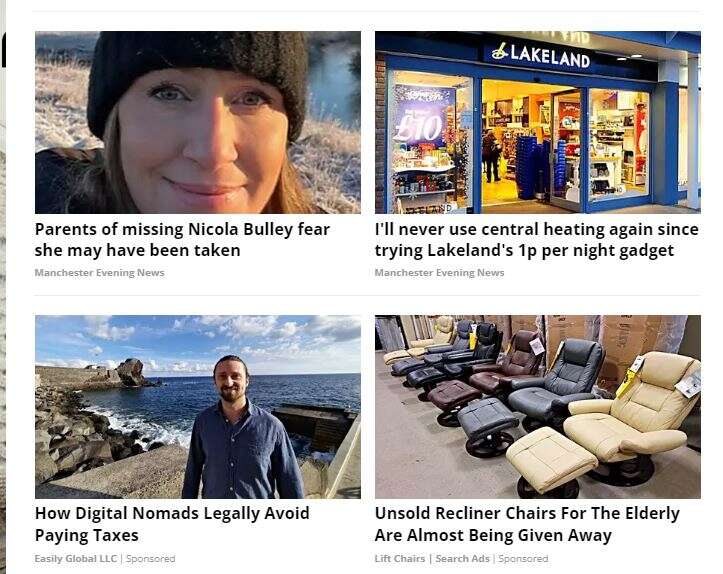
Do you want to know about the one simple health hack that will let you shed your excess pounds without exercising or changing your diet?
Or find out how to book a cruise holiday for practically nothing? Or discover the gadget which can replace your central heating and costs just 1p per night to run?
Then just click on the headlines below!
The BBC apologised this month after reporting that the Manchester Evening News was “rammed with clickbait”.
But does the Manchester resident quoted by the BBC have a point?
Caroline Jackson told the Today programme: “I just find that newspaper websites are just rammed with clickbait and sensationalism, and are just about celebs. I don’t really care about celebs, to be honest.”
As far as sensationalism goes it’s a moot point whether that’s a good thing or a bad thing. And one person’s trashy celebrity story is another’s golden news nugget. News websites should grab the reader and entertain. But clickbait is a serious charge. This is the suggestion that headlines are committing a form of fraud by deceiving readers into clicking on a story which in no way fulfils on the promise being made.
And clickbait headlines are something you will find on Reach websites (and those of many other major UK online publishers). I’m not referring to the independent editorial produced by hard-working journalists but to the Taboola suggested content feed at the bottom of stories, which delivers millions in advertising revenue to the MEN and many other news websites.
It is styled up to look like editorial and intertwines real editorial with sketchy content and dubious news.
If you click on most stories on the MEN you will find examples of pure clickbait in the suggested headlines that appear underneath (which are flagged as sponsored). They are hidden amongst links to real stories from the MEN and bona fide news sites like The Times.
Gut Expert Begs: “Throw Out Your Cereal Breakfast, Have This Every Day” is an example of one sponsored headline.
What is it, I wonder?
The link clicks through to an article that spends 800 words promising to reveal an amazing health secret.
Watch a video to find out the answer… Ten minutes of sales pitch delivered in dubbed voice over still hasn’t told me. What is the answer?
Eventually the video will invite you to spend £135 on three jars of pills whose health-giving properties I am unable to verify but which you won’t find in Boots.
Majorca Holiday Packages Are Almost Being Given Away is another.
They aren’t. This appears to be a cheap click-farming link that sends the reader through to a bunch of holiday websites selling trips to Majorca at normal prices.
The same is true for “Empty Mediterranean Cruise Cabins Cost Almost Nothing” and “Greece Holiday Packages are Almost Being Given Away” (they aren’t).
In a separate but related issue, “I’ll never use central heating again since trying Lakeland’s 1p per night gadget” promotes an MEN story which is not flagged as a sponsored link in the Taboola box. This is a rare example of MEN’s own editorial crossing the line into clickbait. As an electricity bill payer I was certainly lured into clicking and left feeling disappointed and hoodwinked by the story I read.
The piece reads more like an advertorial and arguably is one given it contains several affiliate links for just one product. It’s promoting a heated blanket (which Reach takes commission on sales of), so not quite a substitute for a central heating system. It is rated at 160 watts so costs around 5p per hour, or 1p for about 15 minutes – making the 1p per night headline claim dubious.
The Manchester Evening News is a fantastic website which punches far above its weight (it’s the eighth most popular news website in the UK, with a monthly audience of 18.3 million – more than Metro, ITV or the Daily Express).
I picked the MEN but it should be said the same is true for any other Reach site or the many other national newspapers who work with suggested content platforms.
The value of the MEN to advertisers and its unique selling point versus Twitter, Facebook and the many click-farm made-for-advertising websites out there is its professionally-produced content.
When readers are on trusted, regulated websites like the MEN their guard is down and they are more likely to be taken in by these clickbait links.
Every time readers are are hoodwinked into clicking on misleading suggested content links the brand of the host site is undermined.
These suggested content widgets are an easy way to add serious revenue to news websites so are difficult to ignore, especially if competitors are also using them. I fear though that unless carefully calibrated they do long-term harm to the brand and could be self-defeating in the long term.
MEN publisher Reach said in a statement: “We don’t for a minute buy the notion that clearly labelled third-party advertising should in any way be confused with the journalism our titles produce – and we respect our readers enough to know they can tell the difference. Like many publishers we carry a range of advertising on the site and work hard to ensure that it conforms to ASA guidelines.”
Email pged@pressgazette.co.uk to point out mistakes, provide story tips or send in a letter for publication on our "Letters Page" blog
